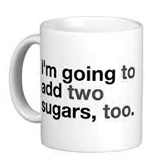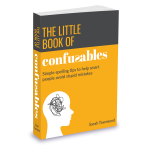13 common confusables and how to get them right first time

The English language contains numerous words that sound alike but have different meanings. They’re known as homophones and they’re easily confused when writing.
Here are some of the most commonly confused words, together with tips for getting them right first time. Which trips you up?
Its/it’s
ITS describes something that belongs to IT:
“The dog chased its tail”
IT’S is a contraction of IT IS or IT HAS:
“It’s going to be sunny”
You’re/your
YOU’RE is always a contraction of YOU ARE:
“You’re going to be late”
YOUR describes something that belongs to you:
“Remember your wallet”
They’re/their/there
THEY’RE is always a contraction of THEY ARE:
“They’re going to be late”
THEIR describes something that belongs to them:
“They forgot their tickets!”
THERE is a place. Think ‘here’ + T:
“Over here! No – over there!”
They’ll/there’ll
THEY’LL is a contraction of THEY WILL:
“They’ll be late”
THERE’LL is a contraction of THERE WILL:
“There’ll be trouble”
Who’s/whose
WHO’S is a contraction of WHO IS or WHO HAS:
“Who’s tried the new restaurant?”
WHOSE indicates that something belongs to someone. Try replacing it with WHO IS or WHO HAS. If it doesn’t make sense, use WHOSE:
“Whose restaurant is it?”
Stationary/stationery
STATIONARY means ‘not moving’. Remember AR, as in parked car:
“The train was stationary”
STATIONERY is paper, pens and other office supplies. Remember E for envelopes:
“Please bring your own stationery”
Affect/effect
AFFECT is a verb meaning ‘influence’ or ‘make a difference to’:
“The rain affects my hair”
EFFECT is most commonly a noun meaning ‘result’:
“The effect of the rain is wet hair”
Complement/compliment
COMPLEMENT means complete, match or add a little extra. Remember E for extra:
“That top complements your eyes”
COMPLIMENT praise or a flattering remark, such as, “You have lovely eyes” (think eyes = i).
Always ‘compliments slip’ and ‘with compliments’.
Wonder/wander
WONDER means to ponder, or to be curious:
“I wonder how she got on”
WANDER means to drift around:
“I like to wander around the gardens”
Accept/except
ACCEPT means receive:
“Please accept my apologies”
Except means apart from, or excluding (think EX):
“Have any chocolate you like, except the caramels”
Practice/practise
PRACTICE is a noun – think ICE:
“Have you done your piano practice?” or “We refer to best practice guidelines”
PRACTISE is a verb – think IS:
“You need to practise”
Principal/principle
PRINCIPAL means main or chief. Remember ‘pal’:
“The college principal”
PRINCIPLE is a fundamental truth or rule:
“A matter of principle”
It also means morally correct behaviour:
“A man of principle”
To/too
TO indicates direction:
“I’m going to London”
It also indicates the infinitive part of a verb:
“I’m going to have lunch”
TOO means also:
“Can I come, too?”
It also means excessively:
“It’s too loud!”
No more confusing words!
Master 600 confusing words with The Little Book of Confusables: 300 gorgeous pages packed with memorable, fun spelling tips – from ACCEPT + EXCEPT to YOUNG + YOUTHFUL.


